Dreams Blu-ray Movie
HomeDreams Blu-ray Movie 
夢 / Yume / Akira Kurosawa's DreamsCriterion | 1990 | 120 min | Rated PG | Nov 15, 2016
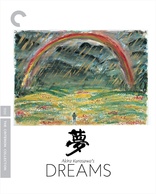
Movie rating
7.7 | / 10 |
Blu-ray rating
| Users | 5.0 | |
| Reviewer | 4.5 | |
| Overall | 4.5 |
Overview
Dreams (1990)
A collection of tales based upon the actual dreams of director Akira Kurosawa.
| Foreign | 100% |
| Drama | 96% |
| Fantasy | Insignificant |
Specifications
Video
Video codec: MPEG-4 AVC
Video resolution: 1080p
Aspect ratio: 1.85:1
Original aspect ratio: 1.85:1
Audio
Japanese: DTS-HD Master Audio 2.0 (48kHz, 24-bit)
Subtitles
English
Discs
50GB Blu-ray Disc
Single disc (1 BD)
Playback
Region A (locked)
Review
Rating summary
| Movie | 5.0 | |
| Video | 4.5 | |
| Audio | 4.5 | |
| Extras | 5.0 | |
| Overall | 4.5 |
Dreams Blu-ray Movie Review
A masterpiece by the great Akira Kurosawa (Ran, Rashomon)
Reviewed by Neil Lumbard March 21, 2020Dreams is one of the most ambitious and beautiful undertakings ever put on celluloid from master filmmaker Akira Kurosawa (Ran, Seven Samurai). Executive produced by Steven Spielberg for the international release, Dreams was as one of Kurosawa's most experimental and profound productions. The film features eight unique segments (each one a “dream” of Kurosawa's) which explores a variety of complex topics (from the horrors of nuclear weapons to the beauty of the art of Vincent Van Gogh).
Using a non-traditional feature narrative, Dreams doesn't have a linear storyline with one cast of the same characters. The production is instead explored through the individual short film segments and Kurosawa uses a variety of distinct characters to fill-in for the role of himself, Akira Kurosawa, the explorer in his own dreams. The shorts form a superb whole: the end-result of the experience simply marvels as we (the audience) experience Kurosawa's long gestating dreams.
The first dream, Sunshine Through the Rain, features a young boy traveling into the wilderness against his mother's wishes. The boy encounters a traveling group of magical kitsune foxes and finds himself getting into more trouble than he first expected to. In the second dream, The Peach Orchard, a young girl in pink wanders through peach orchard trees in a beautiful and serene calm before the oncoming storm. In the third dream, The Blizzard, a group of men climb a mountain during a big blizzard. One of the men in the expedition finds himself coming face-to-face with a Yuki-onna spirit taking on the form of a woman. Death seems to be a question on the horizon. As Kurosawa transitions into dream four, The Tunnel, a discharged army man travels down an empty tunnel. As he comes out of the tunnel, a blue yūrei (ghost) soldier crosses through the tunnel himself. The piece leads to a strange and horrifying finale.
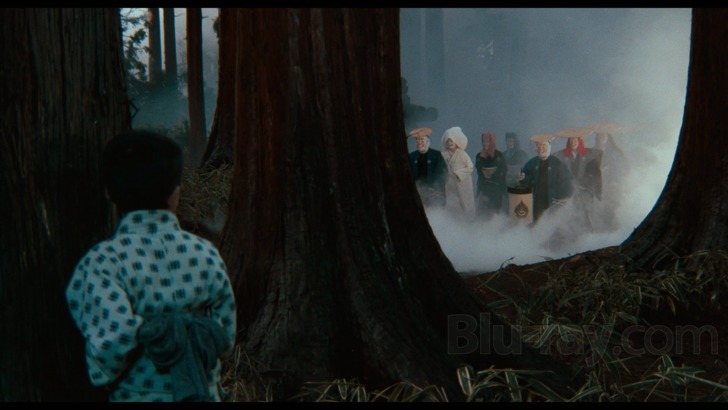
For we all live to dream.
The fifth dream is one of the most beautiful and ambitious shorts (and my favorite of them all). In dream five, Crows, a curious man meets the artist Vincent Van Gogh (performed to perfection by director Martin Scorsese) before traversing through a sequence of the famous artist's most iconic paintings. In the sixth dream, Mount Fuji in Red, the beloved mountain explodes following a big nuclear apocalypse (which brings to mind the horrors of the atomic bombs in Japan). In the seventh dream, The Weeping Demon, a wandering man encounters an Oni-like figure who is actually a mutated human being after a nuclear holocaust. The final dream, Village of the Watermills, is the most tranquil: a young man meets an elder living in a peaceful village. The elder works on repairs for a watermill wheel while sitting beside a calm lake on a beautiful, sunny, and quiet afternoon.
The production was lavish and has so many intrinsic elements at play: the cinematography by Takao Saitô (Ran, Sanjuro) and Shôji Ueda (After the Rain, Rhapsody in August) is gorgeous. Full of color and remarkable vitality, Dreams recognizes the importance of cinema as a visual medium and makes full use of the filmmaking spectrum. The production design and art direction from the collaboration of Yoshirô Muraki (Yojimbo, Throne of Blood) and Akira Sakuragi (The Samurai I Loved, The Return of Godzilla) gives the elaborate production a scale that is remarkable. The costumes by Emi Wada (House of Flying Daggers, Ran) are beautifully designed and surprisingly complex – suiting the roles of the characters from each of the eight shorts.
The score by Shinichirô Ikebe (Kagemusha, Mâdadayo) gives the filmmaking an essence that is unmistakable. Dreams is wise to use Chopin's serene Prelude No. 15 in D-flat major “Raindrop” as the central music to the Vincent Van Gogh sequence (which utilized spectacular special effects from Industrial Light and Magic). The concluding short ends with a sequence of celebration and good music: another reminder of the power that music can have on filmmaking. Astonishing.
Each segment in Dreams feels like a breathtaking work of singular art. One could almost say it's as though audiences are able to traverse through a museum gallery themselves of the various works created by the brilliant Kurosawa. As a young man, Kurosawa wanted to be a painter himself: he dreamed about the possibility of being an artist. Through his cinema (as well as his personal art paintings), Kurosawa achieved his dream. The film is a reflection of dreams fulfilled. Dreams is Kurosawa's most personal masterpiece and a film that any fan of the filmmaker should consider essential viewing... for dreams, in reality, are a celebration of life itself.
Dreams Blu-ray Movie, Video Quality 
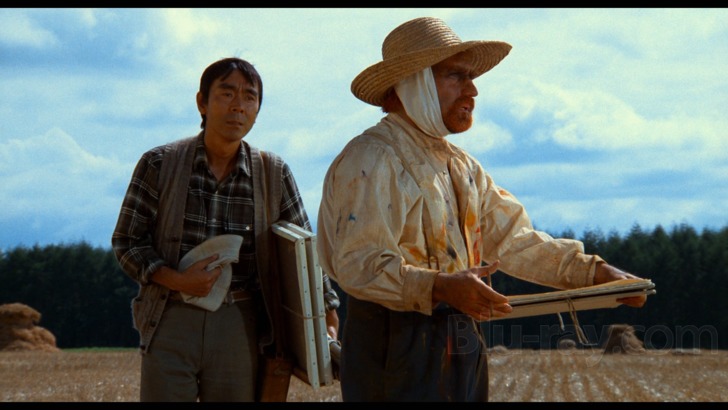
Akira Kurosawa's Dreams has received a 1080p MPEG-4 AVC encoded high definition presentation in the original aspect ratio of 1.85:1 widescreen. The Criterion Collection has given the film a 4K digital restoration. Thousands of instances of dirt, debris, scratches, and other print issues have been removed from the presentation with the fantastic restorative efforts of the label once again showcasing Criterion's dedication to film preservation. Cinematographer Shoji Ueda was involved in the extensive restoration process.
The print is enormously crisp with great detail throughout the entire presentation. There are no signs whatsoever of digital noise reduction (DNR) to dampen the presentation. There is a healthy layer of film grain on the print as well. Colors are robust and dynamic throughout. This 4K master is nothing short of a revelation: Dreams looks breathtaking with its 4K high-definition scan easily surpassing the previous, highly outdated DVD edition. At long last, Dreams has a fantastic transfer.
Dreams Blu-ray Movie, Audio Quality 
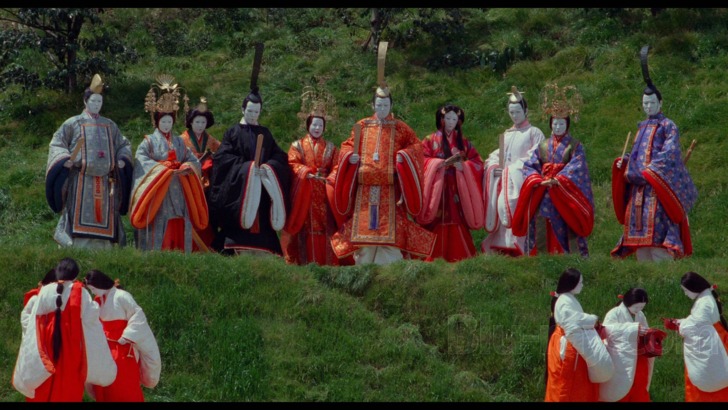
The lossless Japanese DTS-HD Master Audio 2.0 surround sound track is first-rate. The audio has beautiful clarity and surprising heft. The track sounds far more robust and dynamic than one would expect to find. Throughout the entire feature presentation, music plays a key role in the individual stories that unfold, and the precise high-resolution audio does a fantastic job of elevating the film viewing experience. Dialogue is crisp, clear, and easy to understand. The release has no issues in regards to hiss, crackle, warps, clicks, or pops. English subtitles are provided.
Dreams Blu-ray Movie, Special Features and Extras 
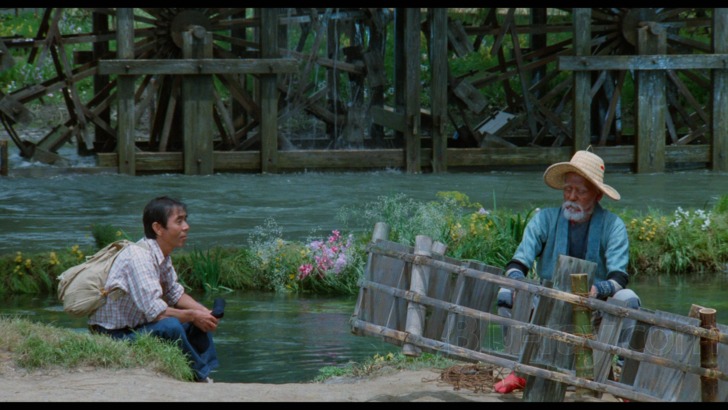
Dreams comes packaged in a beautiful clear Criterion case. Inside the Blu-ray release, a booklet is included with writing on the film, production notes, and restoration details.
On disc supplements include the following:
Audio Commentary featuring Film Scholar Stephen Prince
Making of "Dreams" (SD, 2:30:39) is a feature-length documentary directed by Nobuhiko Obayashi (House). The production was shot with film and s-vhs cameras. The documentary explores the film production with behind the scenes footage and interviews with Akira Kurosawa himself. This is a surprisingly immense behind-the-scenes production with so much footage of Kurosawa directing sequences that film-buffs will be delighted to get a glimpse of the master director in action.
There is also an enormous amount of one-on-one interview footage with Kurosawa (where the maestro is being interviewed by director Obayashi himself). Personal reflections on filmmaking and Kurosawa's career are at the front and center. There are insightful revelations throughout the documentary. The film also includes a assortment of interviews with other members of the cast and crew of Dreams, including none other than director Martin Scorsese (who speaks with frankness about his involvement in playing the part of Van Gogh). An essential, must-see feature-length documentary for fans of the film.
Kurosawa's Way (HD, 52:10) is a documentary directed by Kurosawa's longtime translator, Catherine Cadou.. The film features interviews with eleven film directors about the influence of Akira Kurosawa and why Kurosawa is one of the world's most important filmmakers. Interviews in Kurosawa's Way include Hayao Miyazaki, Bernardo Bertolucci, Martin Scorsese, Abbas Kiarostami, Clint Eastwood, and others. Each filmmaker explains why Kurosawa was such an important figure in developing them as artists. It's a true joy to hear such love and passion for Akira Kurosawa's films explored with these interviews. Eastwood, for example, explains how he may never have had a film career at all without Kurosawa inadvertently inspiring a unique role in his development as an actor.
Teruyo Nogami (HD, 17:23) is interviewed about working with Kurosawa as a script supervisor for decades. Nogami discusses what it was like working with Kurosawa during the making of Dreams.
Takashi Koizumi (HD, 16:03) is interviewed about his role in working with Kurosawa as an assistant director on the filmmaker's last five feature-film productions. Koizumi discusses his involvement in working on Dreams and delves into the process of Kurosawa on set.
Dreams Trailer (SD, 1:47)
Dreams Blu-ray Movie, Overall Score and Recommendation 
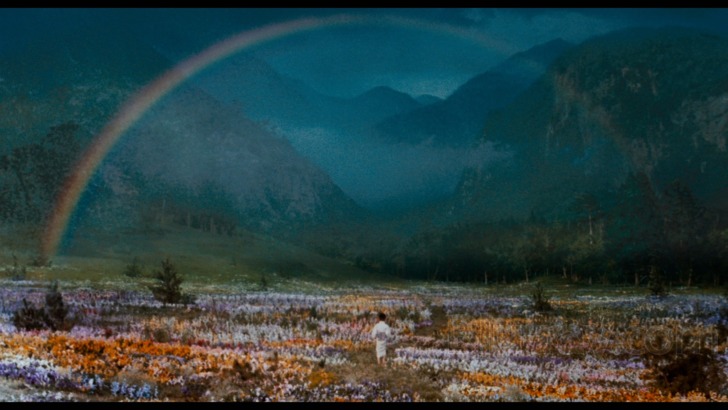
As a college student, I once had an art appreciation class where our professor asked students in the classroom to speak up and provide their definition of art to everyone. I raised my hand. My own answer? "Akira Kurosawa's Dreams."
I'm sure there were many in the classroom who had no idea who I was talking about when I referred to Kurosawa or who wondered what I meant by saying that. Let me elaborate. Kurosawa is one of the most visionary filmmakers the world has ever seen. In watching a film like Dreams, audiences are transported into the art. Every frame is like a canvas painted by the director (who paints brushstrokes with the camera).
Kurosawa, who grew up wanting to be a painter but started directing films an a way to express himself artistically (while still making a real living for himself), is a true artist. Dreams is a perfect embodiment of the reason artists create: it's a film about our passion, our love, and our dedication to creating art that speaks to others while giving us a vessel to expressing ourselves. Kurosawa, who did paint on the side, was also a painter of films: an artist who was so singular, so distinct, and so iconic that his work stands as some of the best in cinema history. Dreams is a masterpiece of ideas.
The Criterion Blu-ray release features an outstanding 4K restoration and hours of engaging supplemental features (including a feature-length documentary about the production of the film). The release is a true treasure-trove for cinema enthusiasts. Without a doubt, Dreams deserves my highest recommendation. Don't miss this essential work of art.
Other editions
Dreams: Other Editions
Similar titles
Similar titles you might also like

Ivan's Childhood
Ива́ново де́тство / Ivanovo detstvo
1962

Ikiru
生きる
1952

Yi Yi
一一
2000

Mishima: A Life in Four Chapters
1985

Tokyo Story
東京物語
1953

Kwaidan
怪談 / Kaidan
1965

Harakiri
切腹 / Seppuku
1962

Perfect Days
2023

Apur Sansar
অপুর সংসার / The World of Apu
1959

Pather Panchali
পথের পাঁচালী / Song of the Little Road
1955

Come and See
Иди и смотри / Idi i smotri
1985

Throne of Blood
蜘蛛巣城 / Kumonosu-jô
1957

Wild Strawberries
Smultronstället
1957

The Silence
Tystnaden
1963

The Passion of Anna
En passion
1969

Cemetery of Splendor
2015

The Human Condition III: A Soldier's Prayer
人間の條件 / Ningen no jôken
1961

Mirror
Зеркало / Zerkalo
1975

The Life of Oharu
西鶴一代女 / Saikaku ichidai onna
1952

Stalker
Сталкер
1979

